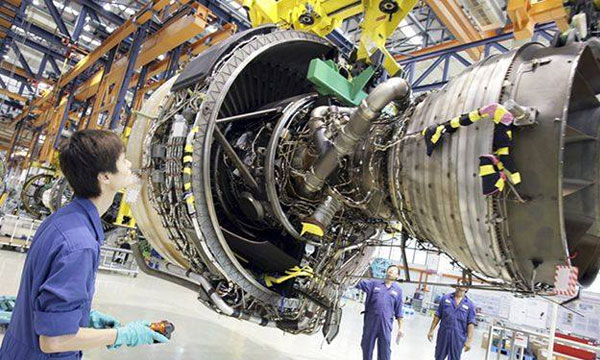How Rolls-Royce is dealing with the future growth in maintenance activities |
| Emilie Drab |
|
|
24 MAY 2017 | 1494 words
|
 |
© Rolls-Royce |
|
|
|
We often talk about Rolls-Royce and its engine production activities. But the British industrial company has a second major activity: maintenance. Just how important MRO is for the engine manufacturer leaps out at you as soon as you look at the first lines in its annual results: it accounted for over half of annual turnover for the group's Civil Aerospace division - reaching 52% in 2016.
And the trend is showing no signs of slowing down. Rolls-Royce is predicting that the number of engines in service will double within ten years, rising from around 3500 in 2015 to 7300 in 2025, which should triple demand for its services. Faced with the scale of this growth to come, the engine manufacturer has completely overhauled its network and support portfolio over the last two years, with the objective of providing a better response to the major challenges it has identified.
The first challenge: adapt its products to each customer's requirements
Lesley So, Head of Marketing - Services at Rolls-Royce, explains to us that this vision is not a recent one, as shown by the anniversary of TotalCare this year.
"We transformed the world of engine OEM 20 years ago when we introduced TotalCare. We turned the market upside down as we truly aligned our business model to that of our customers: in the past, engine OEM was making money when the engine broke and therefore needed to be fixed. The previous model is called break-fix model. How we completely upside-down the model: we said 'actually we stand behind the quality and the reliability of the engine and airlines pay a rate per engine flying hour, we take away the complete cost maintenance and there's a risk transfer.' So we're then completely aligned with our customer being satisfied to keep the engine flying as long as possible. "
At the time the impact was huge on the services network and on the number of customers and Rolls-Royce went from nine TotalCare customers in 2000 to over 85 today. But the landscape is not the same as twenty years ago. "The mix of our fleet in the last 20 years since the first Trent 700 went into service has changed. We now have 6 Trent family members in service, with the 7th, the Trent 7000 on the way. We cover everything from Boeing 777 and 787, to Airbus A340, A380, A350 and of course A330neo. As the engine life cycle and the maturity evolve, we're finding that customers require something more than traditional TotalCare Life and Term. So how we do that for customers to have engines at different stages of the life cycle, with different requirements?"
Three new products were launched in the space of a year to better adapt services to requirements. TotalCare Flex, SelectCare and LessorCare. "TotalCare Flex is fundamentally a different approach. It's an innovative approach and offers customers provisions of how services for engines are approaching their requirements. It covers all the benefits that customers can expect from TotalCare but adds large provision like green life or just towards the end what is needed to facilitate asset value release for the mature engine."
SelectCare is a more hybrid service which enables a service to be combined with the event and at a by the hour flight rate in other domains. "It still allows the customers to select a range of service options and pay for those. This is for customers who have been flying with the fleet for a long time, they know the engine inside out, they feel that they know it better than anybody else and they're comfortable with having time and risk spent on maintenance but they still value the various tech services we provide and they value cost predictability."
And LessorCare, which was launched at the start of the year, is targeted at leasing companies, who own 40% of the worldwide fleet.
Second challenge: get close to its customers
Service activities were initially highly centralised around the Derby centre. But with the growth in the market, Rolls-Royce "needs to assure that we're speaking the same language, that we're operating in the same time zone, that we're able to respond and take a decision practically when the customer needs it", explains Lesley So. This is where the desire to decentralise the decision-making process came from. "We started by moving customer service teams and creating customer service centres (CSC) all over the world, the 1st one being in Singapore for the Asia Pacific region. Since then we implemented the Americas CSC and the Greater China CSC. The latest one that is going to be deployed is the Middle East and Africa CSC, which will be some time this year, in Abu Dhabi."
The first results are excellent: "giving CSC the empowerment they will make decisions, they will keep engineering capabilities... results in over 75% reduction in issues resolution time", according to the observations made in the Singapore centre. The ASTs (Airline Support Team) are now supported by each of these hubs, even if communication is maintained with the main centre at Derby.
Third challenge: increase capacities
"In front of the volume of growth in terms of flying hours, the geographical location and the challenge that comes of having growing customer base, we forecast a big growth in shop visit demand. We're at the point where the demand is approaching the shop capacity. If we do nothing, there is going to be a lot more demand than capacity for shop visit. We recognized that and for a number of years we're developing our network to ensure the requirements in terms of volume but also to remain capable in competitive going forward." continues Lesley So. Rolls-Royce has therefore been working to increase the capacities of its own workshops. But the engine manufacturer has also been working to develop its CareNetwork.
"New shop capacity is likely to be for our newer products, such as the Trent 1000, Trent 7000 and Trent XWB. We are seeing growth in CareNetwork members in which Rolls-Royce has no equity stake. For example, last year we announced two additional non-equity facilities: Delta TechOps and Mubadala. This is just the start, it's an indication of the direction we're going."
This is a major change for Rolls-Royce, which has decided to break with the model which governed everything until two or three years ago within the group and which involved having a stake and limiting the shares of joint enterprises and partner workshops by giving them territorial rights. These have been abolished and competition is now open. "The need for change is recognized and that's something we're actually doing to make sure that there is that growth in terms of capacity that will meet the growth in demand."
Fourth challenge: extend the support field
Rolls-Royce is convinced that its know-how in the support field may go far beyond maintenance alone. "If you think of what engine OEMs do, a lot of time is focused on maintenance that represents 4% of the operating cost of an airline. Actually, we know that we can do a lot more to support and bring value to our airline customers than just that 4% of maintenance."
This is why the British engine manufacturer has also developed solutions to improve airlines' reliability, their performance, their asset management or transitions, all areas which cover up to 65% of their costs. "It is another shift in our thinking and we have translated it into actual service innovation. We want to manage the availability of the aircraft at the gate prior to departure, ensure the aircraft is flying efficiently using optimized route network and manage inventory so that they can fly."
Rolls-Royce opened its CareStore in March to enable customers to more fully understand the range of services proposed in the pure maintenance field and in operational support. This brings together the details of the OEM engine manufacturer's different solutions and enables its customers to select the services which best meet their needs, services which will expanding constantly.
"TotalCare, SelectCare, CorporateCare, Foundation Services and each of other solutions are all available as part of the CareStore. What we're calling CareStore is an online gateway to innovative solutions. The store isn't just static, it will continue to grow, there's going to be more products within it. And that what it's all about: we turned the world on its head, we're doing it again and all is going to be available within the CareStore."
TotalCare's effectiveness has already been demonstrated and the figures speak for themselves. 90% of the Trent fleet is covered and all customer airlines commit to the MRO solution again when they add new engines to their fleets. Today, Rolls-Royce is supporting over 85 customers and covers over 14 million annual flight hours. But its vigilance and its market awareness - which drove it to implement this major transformation three years ago - remain just as fresh. And there's no chance that the wave of growth to come in maintenance will quench its appetite.
|
|
 |
Emilie Drab
Assistant editor
Civil aerospace, Air transport
|
|
| |
They made this section possible |
|
|
|
|
|
|
|
|
|
|
|
|
|
|
|
|
Top stories |
|
|
|
|
|
Top stories
|